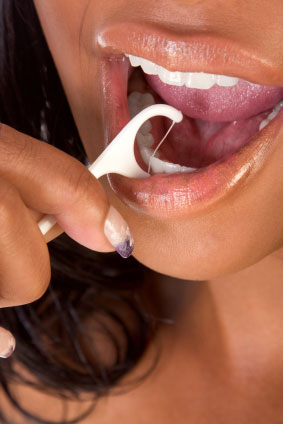If your gum is bleeding consistently, you should not ignore it, because healthy gums do not bleed. Bleeding gum can happen for a number of reasons like gingivitis or the side effects of a pregnancy, but bleeding gum can also be a sign of gum disease which poses a serious threat to our health and life span,
Changing your oral care routine can also make your gums bleed, at least at first. Here are the ways to stop bleeding gums once and for all:
1. VISIT A DENTIST
The best way to stop bleeding gums is to see your dentist. A dentist can explain the causes of bleeding gums. He will examine your teeth and gums and determine if you have a more serious condition, such as advanced gum disease. He might take an x-ray of the teeth and gum and if he believes treatment is needed then he will advise a treatment plan.
2. BRUSH YOUR TEETH PROPERLY
The biggest cause of bleeding gums is plaque buildup along the gumline. When you don't remove plaque in a timely manner, it hardens into a calcified material that plaque adheres to and continues to irritate the gums, which cause them to bleed and can progress into gum disease. The best way to reduce plaque buildup and your risk for bleeding gums is to brush properly!
Although we all know we need to brush to avoid bleeding gums, however, most of us are not doing it often enough or long enough.
*Always use a fluoride toothpaste.
*Brush twice a day, for at least 2 minutes. It takes 2 minutes to clean a
mouth full of teeth.
* Floss at least twice a day. be sure to floss beyond the gum line to
remove more plaque.
Brushing twice a day is typically recommended for people who don't have any dental disease. So it is imoortant for one to brush after every meal and snack for at least 2 min but you should wait around half an hour between eating and brushing as this will reduce the risk of causing enamel damage.
3. LOOK OUT YOUR TOOLS AND BRUSHING TECHNIQUE
If you do brush and floss regularly and also pay a visit to your dentist but still experiencing bleeding gums, then your oral hygiene care tools could be what's causing your gums to bleed. Soft bristled brushes are more effective because they can bend into the curves and corners and tight spaces around your teeth and gums. A hard bristled brush can cause irritation which leads to traumatic bleeding.
In some cases it might not be the tools that are causing the bleeding, but the way you are using them. Many people use brushes that are too stiff and they brush their teeth very roughly. Hard brushing and stiff bristled brushes won’t get the job done. But rather, Use a soft bristled brush and a gentle circular motion to get the best results! Hard brushing can further damage the soft tissues of your mouth.
4. FLOSS
Lack of flossing leads to the development and progression of bleeding gums. Flossing is important because gum disease is the result of bacteria that is organised in what is called a biofilm. They are covered in a sticky substance that protects the bacteria from attack and make them difficult to remove from your teeth and gums, and flossing is the number one way to remove the plaque biofilm and disrupt this malicious bacterial invasion. However, the plaque bacteria reforms quickly (in less than 24 hours) which is why even people with healthy mouths need to floss at least daily to help prevent the formation and spread of bacteria throughout their mouth.
5. MAINTAIN A HEALTHY DIET AND LIFESTYLE
Diet does play a role in both the prevention and maintenance of the dental problem. What you eat and when you eat it also plays a part in keeping your gums from bleeding. A diet that is high in raw fruits and vegetables will provide you with the vitamins and minerals that are essential to healthy teeth and gums. Foods that contain lots of sugar or simple carbohydrates increase your risk for tooth and gum problems, as sugar and carbohydrates feeds dental plaque and creates an ideal environmentfor plaque to form. Eat a balanced diet and limit snacking between meals.
Stay away from smoking and other tobacco products, which can aggravate bleeding gums.
6. ANTI-BACTERIAL MOUTH RINSE
Anti-bacterial mouth rinse are useful in the fight to cure bleeding gums. They make your breath smell better. Usually rinsing 1-2 times daily for 30 seconds is sufficient to help reduce bacterial infection. Also you can rinse your mouth with salt water or hydrogen peroxide to keep the area clean. Avoid mouth washes that contain alcohol, which can dry out your mouth.
7. CONSIDER YOUR MEDICATIONS
Certain over-the-counter pain relievers, like aspirin, thin the blood and can therefore cause bleeding gums. It's also possible for a prescription medication to cause gum bleeding. Always talk to your doctor if you think a medication is causing side effects, even if they seem mild.


No comments:
Post a Comment